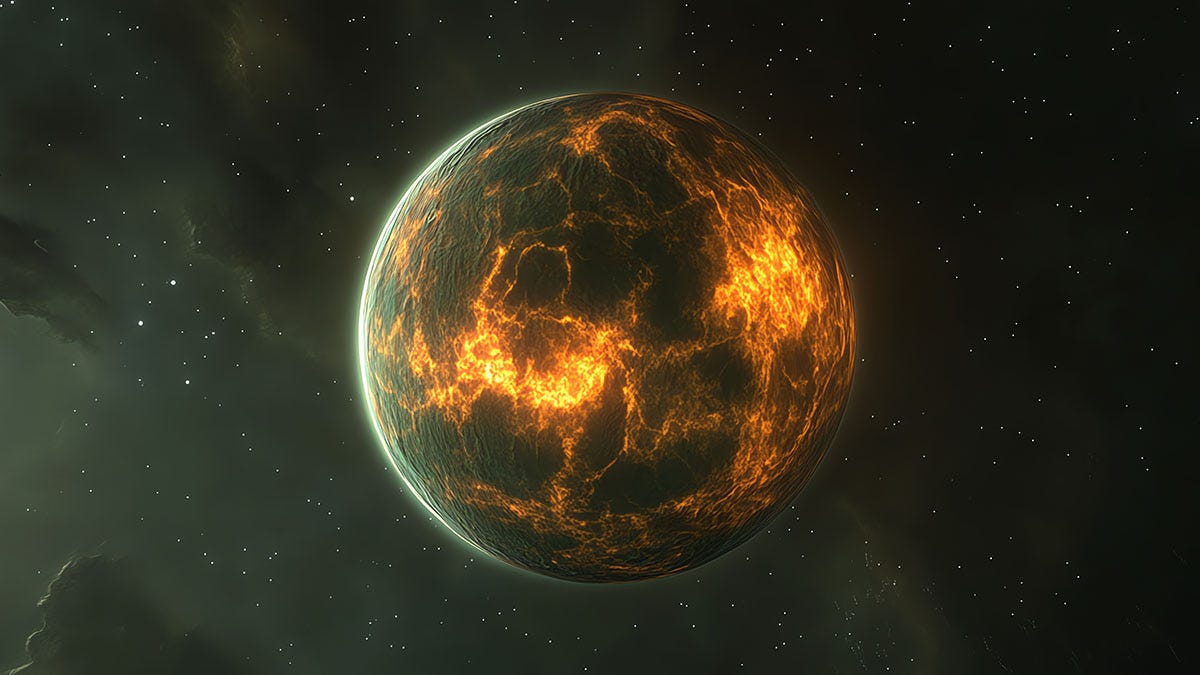your science briefing for 02.13.2025
The most volcanic planet we've ever seen, why vast satellite constellations pose a real threat to aviation, how AI is unleashing a quiet nudepocalypse, and more...
Recently, we’ve learned about the windiest planet we know of so far. Now, we’ve got the most volcanic world in the known universe, L98-59 b. How do we know know it’s that volcanically active? We can’t actually see it with our telescopes. It’s less than half the mass of the Earth and rotates around its star in only two and a half days, so it may well be the core of a burnt down Hot Jupiter. But we can see starlight bouncing off its atmosphere, then look at the spectral signature reflected at us to see an awful lot of sulphur. So much, that the planet must be volcanically active at downright apocalyptic levels to have the signature it does… (New Scientist)
With a lot of planned satellite constellations about to make space extremely crowded and potentially dangerous for the future of space exploration, a trio of academics had an important question. What happens if our lower orbit has so many objects in it, and those objects could fall out of the sky thanks to almost certain collisions with space junk, or each other, or micrometeorites, and hit a plane on their way down? As we take more and more flights and launch more and more satellites, we need to have a good plan to manage the risks and consequences… (Nature Scientific Reports)
Horrific fallout of a seasonal famine, rare but documented burial rite, battlefield snack, or a tragic situation Donner Party style? That’s the question archeologists are asking after finding what seems like very clear evidence of cannibalism in Maszycka Cave in Poland. The writeup itself isn’t very clear about this, but right now, researchers aren’t sure why ancient Europeans in this cave were eating other humans, and still have a lot of work to do to figure that out as there are a lot of scenarios that fit the evidence, but are far from airtight… (LiveScience)
Albert Einstein is like the DJ Khaled of physics because all he does is win. Okay, awful jokes aside, astronomers once again confirmed a textbook example of a gravitational lens in the wild. Basically, then two galaxies align perfectly from our point of view, the mass of one galaxy distorts the image of the other, bending the path of light around the fabric of space and time, magnifying the galaxy in the background and smearing its image into a circle around the foreground one. It’s yet another proof for the theory of general relativity. Also, it just looks really neat… (PopSci)
We’ve talked about the nightmares that can be unleashed by generative AI capable of creating fake nudes or pornographic images and videos. If you thought these were all just hypothetical threats, they are not. There have been scandals in several schools as these tools were used to create fake porn of students, and this continues to routinely happen. And it’s now one of the tools in stalkers’ arsenals to psychologically torture and blackmail their victims into compliance while law enforcement struggles to take the problem seriously, both in the U.S. and the UK… (BBC)
![[ world of weird things ]](https://substackcdn.com/image/fetch/$s_!V-uR!,w_80,h_80,c_fill,f_auto,q_auto:good,fl_progressive:steep,g_auto/https%3A%2F%2Fsubstack-post-media.s3.amazonaws.com%2Fpublic%2Fimages%2F93728edf-9a13-4b2b-9a33-3ef171b5c8d8_600x600.png)

